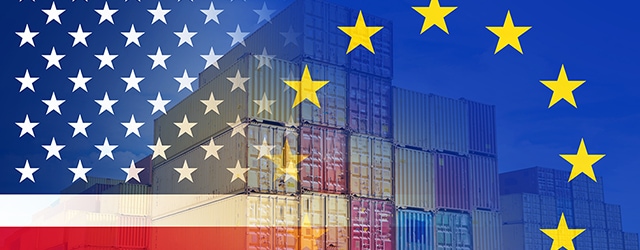Will the EU follow China intit-for-tat escalation with the US over tariffs?

Exporters and importers both felt the sting of new US tariffs on $7.5 billion of EU imports as they came into force over the weekend. The world is now braced for a response from Europe.
The World Trade Organization formally authorized the trade tariffslast week after a failed attempt by the EU to secure a negotiated settlement to stop a tit-for-tat escalation. The tariffs are the latest episode in a 15-years long dispute over illegal subsidies for rival US and European aircraft makers Boeing and Airbus. The new levies, which target French wines, Scotch whiskeys, Italian cheeses and Spanish olives with a 25% levy, are hitting the agri-food sector hardest.
“This is very bad news for our industry,” said Karen Betts, the chief executive of the Scotch Whiskey Association, in a statement, explaining the product is now over 60% of the UK’s tariff bill for the subsidies it provided to Airbus; eight times more than the next most valuable UK product on the tariff list. She continued: “We expect the damage to our industry to mirror the damage caused to exports of American whiskies to Europe since the EU imposed a 25% tariff in July 2018.”
The pain is also being felt across the English Channel, particularly with small companies. Businesses dealing in Spanish olive oil, the world’s biggest producer, will be among the hardest hit according to Joseph Profaci, executive director of the North American Olive Association which is “advocating strongly” for the tariffs to be removed.
The European Commissioner for Trade Cecilia Malmström said on Friday that the EU had no alternative but to respond in “due course” with its own tariffs. She said: “Imposing tariffs on each other serves nobody’s long term interest. It will inflict very significant damage to the highly integrated supply chain of the aircraft sectors in the US and the EU and will result in collateral damage to many other sectors already suffering under the current trade tensions.”
She added that both the US and the EU had a joint responsibility to sit down and negotiate a settlement with regards to subsidies that is compliant with the WTO. But while food exporters will struggle to swallow that latest round of tariffs, another set of 25% tariffs—scheduled to hit European cars and auto parts on November 14—could threaten to stall any attempts to reverse the trade spat. The tariffs were originally scheduled for May, but US President Donald Trump, already embroiled in a trade dispute with China, had delayed the decision for six months.
The only glimmer of hope for a resolution now comes via US commerce secretary Wilbur Ross who, according to the Financial Times, floated the idea of fresh talks with the EU to avoid another raft of tariffs. He told the newspaper that Trump could choose “some other form of negotiation.”
If talks fail and the next lot of tariffs do go ahead, they could mean a painful double blow for the European automotive industry already braced for a “no-deal” Brexit. Earlier this year, Erik Jonnaer, secretary-general of European Automobile Manufacturers Association said Brexit and trade tensions with the US posing a “serious threat” to the industry: “Extra duties would mean that all car manufacturers in the United States, whether domestic or international, would face a significant increase in costs.”
This, he added, would have to be mitigated by lowering margins, reducing production costs or passing additional costs on to consumers, making US automobile manufacturing less competitive and having a “counterproductive effect on the US economy.”



